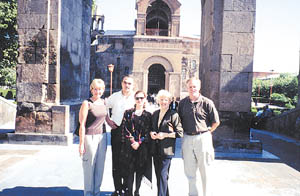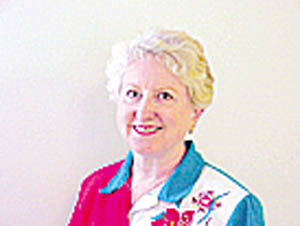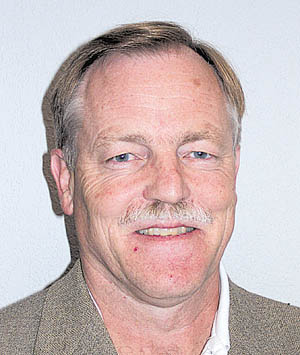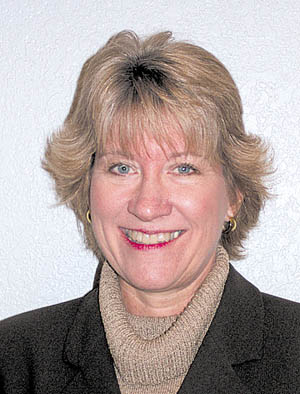Barlow Der Mugrdechian
Advisor

Three faculty members from the Craig School of Business at Fresno State: Tom Burns, Diane Decker, and Elizabeth Shields, visited the Faculty of Economics of Yerevan State University in October 2002. Their visit was part of the three-year Newly Independent States (NIS) College and University Partnership Program grant received by Fresno State in 1999.
The grant partners California State University with Yerevan State University. The Program is funded by the Bureau of Educational and Cultural Affairs in Washington, DC and administered through the Armenian Studies Program at Fresno State.
Professor Shields had visited Armenia previously, but it was a first-time visit for Professors Burns and Decker. Their visit involved working with faculty in similar fields of business and economics. In Spring 2003, a group of faculty from Armenia will make a visit to Fresno State, as part of the continuing activities of the project. The three faculty were asked their views on their visit, and their remarks appear below, in their own words.
Elizabeth Shields – Department of Finance & Business Law

My visit to Yerevan State University in October 2002 was much more heartening than a year earlier. I found a greater air of optimism in Yerevan compared to my visit in 2001. This was bolstered by the hustle and bustle in the streets as workers hurried to finish laying the new sidewalks financed by the Lincy Foundation before winter set in. The sidewalks of almost every major street in the downtown area were being torn up and new cobblestones laid.
Each street has a different shape of cobblestone but all the stones interlock tightly to form a very aesthetic pattern. A new boulevard is being built between the Opera House and Republic Square causing temporary disruptions to traffic in that area. Electricity cables and gutters were being relaid which means that the traffic lights at the intersections around Mashtots Avenue and Abovian Avenue were not working, adding even more thrills to crossing the street whether on foot or in a vehicle. Most museums, art galleries, the Opera House and Philharmonic Hall were closed for renovations, also financed by the Lincy Foundation. But the people were as welcoming, friendly and hospitable as ever.
In the Department of Economics at Yerevan State University the administration and faculty have started the formal procedures to adopt a new curriculum in Management Information Systems, a joint development of the faculty in Yerevan and at California State University, Fresno. Together with the young enthusiastic faculty and the new up-to-date computers purchased with the NIS grant this new track in the Master’s degree program will attract the brightest and the best. It will also provide a source of well-trained graduates for the burgeoning software development industry in Armenia. Dr. Sasan Rahmatian (CSU Fresno) is to be commended for his untiring efforts to introduce this new curriculum. We hope to replicate this success in the areas of Finance, Management and Marketing in the coming year.
Tom Burns – Department of Management

After 24 hours of travel and arriving (10:00 at night) at a very difficult airport, Zvartnots,(badly in need of updating), the next day was an interesting surprise. I was very interested in the amount of energy that Yerevan has as a city. There is such a dichotomy as there is a lot of developed infrastructure but at the same time a lot of it has not been maintained. You can see some very well developed businesses right next to basically empty structures.
After looking at the statistics on per capita income, size of the economy, I was expecting more abject poverty and associated issues. We have a tendency to over-simplify both our expectations and observations as human beings. In Armenia’s case one might immediately expect a similar lack of sanitation, lack of human development (education, skills, knowledge or broad experience), lack of responsibility that other developing countries have.Although there is obvious need for more public services in fixing and cleaning facilities, reclaiming abandoned facilities, etc., there was much more pride in the people about personal appearance.
I saw no sewage in the streets, I felt safe in all the places that I visited. I would suggest it is a country that has experienced a better standard of living, but unfortunately their change of economic systems has not allowed the prosperity that should be associated with a more developed population from a skill, education and talent basis.
It takes a little effort to get the Armenians to open up (as you would find in any major city) but once you have accomplished that you would find them very open and generous. They have tremendous pride in Armenia but at the same time they are blunt about its economic dilemma. As I heard them explain it, they are actually full of pride of their past economic success, not necessarily of communism. Simultaneously they see they need change more to achieve renewed success than heavy political ideology change. The family orientation is strong, and the people that I met were ambitious and showed a lot of pride in their education, appearance and other personal issues. I can also say they are rather “robust” in their social engagements and put a great importance into these functions (there is a tradition and order, e.g. the honor given with the toasts, but these are also informal and somewhat chaotic).
We found a very bright group of students (at least at Yerevan State) who were as good as we find at Fresno State. They are not only knowledgeable and bilingual (or multi-lingual) but could grasp many of the concepts that we would lecture on even though they had not heard them before. It appears that their early education is very sound to me. I would challenge some of their curriculum as it, in my opinion, fits the old economic system with emphasis in economic theory that trains people for potential bureaucratic positions in the government. I feel they could blend this with many more classes in general business areas. This would lead to more business start ups and give new businesses better potential candidates with specialized skills that businesses seek such as planning, accounting, information systems, etc. We were able to personally meet many of the students and found them similar to our students, fun loving, inquisitive, many committed to the University, some not committed.
I attempted to bring some new curricular and teaching methods to Yerevan. I took three basis course areas to Armenia, specifically Entrepreneur Studies, Strategy Planning, and International Management. Additionally I wanted to demonstrate case studies that emphasize practical application of material, and we also introduced a class that will be conducted over the Internet as a distance-learning course this next year.
The Professors are all very capable people and many times have a lot of public experience (government). But their was far less business experience than our faculty. Also, I would classify them into two groups. The old or original professors are associated with the old economics training while I found the younger professors all looking at new areas and curriculum. They will need time and help in developing their expertise in these new topics. I also feel that some of the older professors can also be coaxed to these new topic areas. Many of their topics are math model and theory based, where as we suggested that more behavioral factors need to be covered and to add emphases on applied material.
I feel the project is very worthwhile, the core and talent for development is there in the form of quality inputs (students and professors with some change). I also feel the course material that I offer is very relevant to the country’s return to economic success. The shift to capitalism will require a change in curriculum that emphasizes practical business development. More importantly, the Armenians work at making a connection with you that makes you want to continue. They are engaging people with whom you want to create a good long-term relationship.
As a suggestion to those who get involved in this type of activity, it should be considered a two-way relationship. You will learn from them, they have some areas where they have some things we need to learn from (family orientation, living for the moments-quality of life concern). They can use some assistance but it should be thought of as a sharing relationship not one of, I have it all and you need to change completely to my ways. They need assistance in the economic part of their society but many other parts of their culture are very strong and positive.
Diane Decker – Department of Management

I was impressed with the country. I see that they are making strides to improve the infrastructure (some roads, sidewalks, the greenbelt) which will make the city even more attractive. As I mentioned to several of the individuals in Armenia when asked about my impressions of the country, my response was that it was romantic. I loved the outdoor cafes.
The young people appear to be up on the latest fashion trends and are very progressive in their thinking. The students and the professors seemed very open to accept new learning methodologies. The people that I met were very friendly and willing to accommodate any request I had.
The educational system has a very solid foundation in my opinion. There are new areas that could be instituted to add an applied element to their solid knowledge foundation. Some additional courses could be human resource management, business strategy, business plan writing. I would also like to see more interaction between businesses and the University. I believe both could benefit from this type of relationship. The students were very bright and seemed to have a good grasp on the course material. They were eager to ask questions and participate in new teaching methods. I enjoyed talking with students, both in the classroom and also on a one-to-one basis.
I taught two classes to undergraduates-one on human resource management in America and one was an experiential learning exercise to reinforce the benefits of teamwork and decision making. I also met with the Student Council to discuss how our organizations are set up at CSUF and what type of programs our students are involved in as student groups.
I would return to Armenia again. Absolutely! Yerevan is a lovely city. There are so many historical sites to visit-the city is rich in history. I enjoyed the people, the food and all of the activities.
 Hye Sharzhoom Armenian Action
Hye Sharzhoom Armenian Action